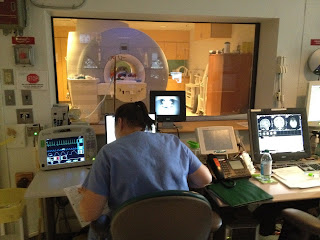Ultrasound: Intrepreting Your Results
Understanding your Results
What do my results mean ?
If the results of your ultrasound show
that you do in fact have an AAA, the next step will be to determine the size of
the aneurysm to understand its severity.
Possible Results:
- All Segments of the Abdominal Aorta less than 3cm in diameter
This is a perfectly normal result and
indicates that you do not, in fact, have an abdominal aortic aneurysm (AAA). As it takes a very long time to
grow, there is little chance that you will develop one after the age of 65 and
therefore no follow-up screenings or scans will be necessary.
- A Segment of the Abdominal Aorta between 3-5.5cm in diameter
If your aneurysm is found to be within
these measurements, you have a small or medium aneurysm. This means it’s in or
around the same size as an earphone. Aneurysms of this size are not of high
risk and because of this, no treatment is required just yet. You will, however, have to attend various follow-up scans, such as another ultrasound, CT, MRI or
angiography, to keep an eye on its growth and ensure it does not reach a much
larger size without being noticed. The frequency of these scans is dependent on
the size of the aneurysm, with small ones needing to be scanned yearly and
medium ones needing to be scanned every three months. Due to its slow growth
rate however, it is very unlikely that you will ever need treatment and you
should have no problem resuming daily life as normal.
- A Segment of the Abdominal Aorta over 5.5cm in diameter
If your scan results show that a section
of your abdominal aorta is 5.5cm or wider, then you have a large aneurysm. This
is equal to about the size of a biro cap and means you must be immediately
referred to a hospital vascular team of specialists, who will most likely
recommend an operation. This meeting typically takes place within a fortnight
of the ultrasound scan. Follow up scans are common, such as CT, MRI or
Angiography to give a better understanding of the aneurysm itself before
surgery is carried out.
So What's Next?
For more information on what your treatment options are with an AAA we recommend discussing your treatment plan with your healthcare practitioner. For an explanation of possible treatment, the following resources may be useful, as recommended by the HSE https://www.hse.ie/eng/services/list/3/acutehospitals/hospitals/waterford/surgery/vascularpatientinfo.html
AAA – The Operation
AAA – Endovascular Repair (EVAR)
https://www.circulationfoundation.org.uk/help-advice/abdominal-aortic-aneurysm/open-aaa-repair-operation
https://circulationfoundation.org.uk/help-advice/abdominal-aortic-aneurysm/endovascular-aneurysm-repair-evar
Aortic Aneurysm Repair
https://youtu.be/A-_dXIXc0hc



Comments
Post a Comment